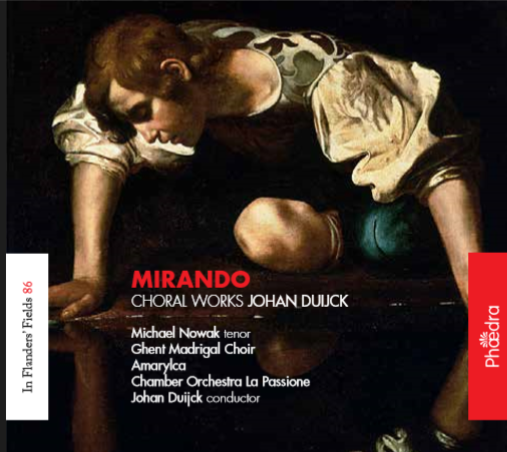Johan Duijck about Mirando
 |
Mirando
Choral works of Johan Duijck |
Mirando – A mirror to friendship and music
Footballers jump onto each other’s shoulders after scoring a goal… It is similar in the choral world after a successful concert, although more discreet: choir members and conductor mingle, congratulating one another, sometimes giving each other a hug, thankful that they can share in the ‘wonderful beauty of music’. Hence ‘Mirando’, which means being surprised and full of admiration.
For 42 years I have worked intensively with the Ghent Madrigal Choir. Thousands of hours of rehearsals, over 400 concerts from Hondarribia to Hannover, Leicester to Pécs, with 60 different concert programmes including music from the Renaissance to the Modern. Of course the choir also sang most of my own choral compositions. ‘Mirando’ is an anthology of my works that the choir has recorded over the years:
Lentetriptiek (Spring Triptych, opus 1, 1981) recorded in 1983,
Narcissus et Echo (opus 8, 1988) in 1992,
Laudate pueri (opus 12, 1992) in 1997,
A Mirror to St. Nicolas (opus 18, 1998) in 2014.
In between these, the choir recorded two more of my works, el Camino del Alma and Dixit Dominus. I hope this collection gives an insight into the unity and evolution of my style of composition and the sound of the choir.
Some writers say that they keep writing and rewriting the same book. I believe that I know how that feels. The outward appearance of my compositions has changed, but the essence, my own voice, remains the same. Vox manet. ‘The bird is known by its call and a man by his voice’.
Over these 42 years there has been an obvious and natural evolution in the sound and style of the Ghent Madrigal Choir, but our ideal of sound has not changed: open, free flowing, and unsophisticated. The composer and choir have both grown in craftsmanship and imagination. We have walked this path together, inviting each other to challenge the boundaries. Composition and the choir singing are as mirrors to one another.
A Mirror to St. Nicolas
In 1997 Rudy Van der Cruyssen, conductor of Rondinella (a youth choir from Knokke-Heist), asked me to compose a cantata for a girls’ choir with a string orchestra. This would serve as an ‘appetiser’ to the ‘main course’ of Benjamin Britten’s Saint Nicolas Cantata for a concert programme. The idea to write a reflected version of Saint Nicolas came quite quickly. At the centre of Saint Nicolas there is a mixed choir having most of the action, placed in front of the public together with the tenor soloist and orchestra. The girls’ choir is situated in the gallery, behind the audience. The music is bounced back and forth like a ball. Britten repeats this spatial game in the War Requiem and Voices for Today. In the Mirror the disposition is reversed, with the girls’ choir standing with the tenor solo in the spotlight. The mixed choir has a more modest role becoming as it were the gallery choir. The instrumentation in the Mirror is identical to that in Saint Nicolas: strings, piano duet and a great variety of percussion. Fifty years after the first performance of Saint Nicolas (1948), it seems natural to try to present a mirror image as homage to one of my most beloved composers, Benjamin Britten. In the Mirror one can sometimes hear masked motifs from Saint Nicolas. To do this recording justice I asked the unsurpassed girls’ choir Amarylca (whose conductor is Noëlle Schepens), the chamber orchestra La Passione and the tenor soloist Michael Nowak. I can only be eternally grateful for their perfectionism and enthusiasm in which they have worked at this difficult score.
Laudate pueri was commissioned by the international conducting course in Lleida/Lérida (Catalonia, Spain). The assignment was to produce a work that was easy enough to learn for the choir groups, but including technical difficulty for the student conductors. That’s why I used a technique of short, identical, repetitive melodic fragments while the time signature constantly changed. It is also necessary to have accomplished pianists available. Laudate pueri won the West Flanders Composition Prize in 1992.
Narcissus et Echo was written for three part ladies’ choir and piano. The text comes from Ovid’s Metamorphoses. This beautiful story invites colouring of the text and tragic nature of the piece.
Lentetriptiek, finally, is my ‘first born’, my ‘Opus 1’. I chose the texts out of the rich Medieval Dutch Poetry of the twelfth and thirteenth century. Hadewijch, Henric van Veldeke and Duke Jan 1st of Brabant, sing the praises of the months of March, April and May. I have tried to keep the medieval atmosphere within the sound of the text: folklike tunes, open fifth chords, consecutive fifths and octaves. You will hear an intense imitative way of writing, and the contrast between playful rhythms and that of a more contemplative lyric. I confess the influence of Hugo Distler and Vic Nees. In 1981 Lentetriptiek won the Composition Prize of East Flanders.
Nulla amicitia.
The Choir sings this canon at the end of almost every concert as an encore. This uplifting song is our creed, the choir and conductor thanking one another for their loyalty and enthusiasm over the years. Nulla amicitia sine musica, sine amicitia nulla musica. Music and friendship mirroring each other.
Johan Duijck
 Filip Dujardin-77da9027fc.jpg)

